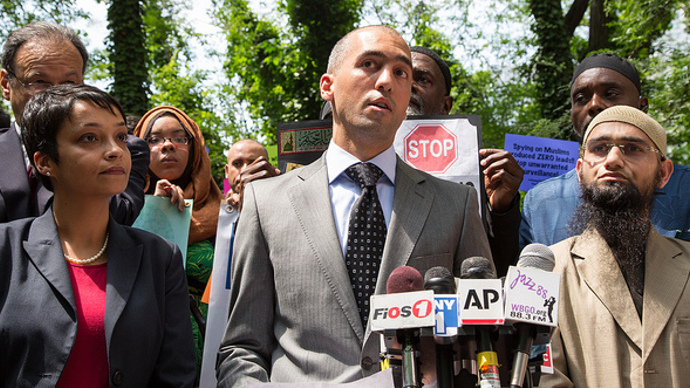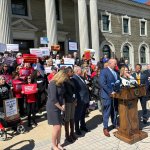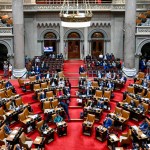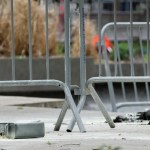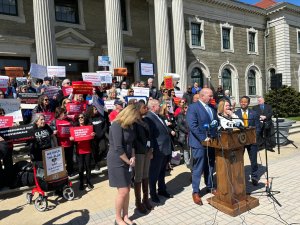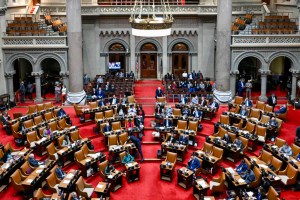The New York City Police Department agreed to increased oversight of counterterrorism investigations as part of a settlement in a lawsuit challenging the department’s mass surveillance of Muslims—including on Long Island—after the Sept. 11, 2001 attacks.
The settlement, which was filed in federal court in Brooklyn on Thursday, stipulates that the city appoint an independent civilian representative entrusted to monitor police investigations and report any violations to the police commissioner or federal judge.
The city and civil rights attorneys representing three New York Muslims, two mosques and a nonprofit also agreed to a cap on how long investigations can take place, several safeguards to make certain that investigations don’t violate a person’s constitutional rights, anti-discrimination measures, and a requirement that the use of undercover officers and confidential informants be authorized by a high-ranking police official.
“There must be an objective, factual basis for initiating” an investigation, the settlement states. “A mere hunch is insufficient.”
Civil rights attorneys lauded the agreement for establishing much-needed safeguards to prevent abuse and religious profiling of a disenfranchised population. NYPD officials argued that the settlement wouldn’t hamper anti-terrorism efforts.
As part of the settlement, the city admits no wrongdoing.
“This settlement is a win for New York Muslims and for all New Yorkers, who have a right to be free from discriminatory police surveillance and to practice their religion without stigma or fear,” Hina Shamsi, director of the American Civil Liberties Union National Security Project, said in a statement.
New York City Police Commissioner Bill Bratton said the agreement is the latest step in an effort to build bridges with the Muslim community. The new measures, he said, brings policing practices “closer in line” with FBI protocol.
“The proposed settlement does not weaken the NYPD’s ability to fulfill its steadfast commitment to investigate and prevent terrorist activity in New York City,” added Deputy Commissioner of Intelligence and Counterterrorism John Miller.
The ACLU, along with several other civil right firms, sued the city after the Associated Press revealed mass surveillance of Muslims in the five boroughs, New Jersey and Nassau and Suffolk counties. The AP’s series on the NYPD’s clandestine targeting of Muslims won the outlet a Pulitzer Prize. The so-called Demographics Unit, which has responsible for monitoring Muslims, created maps of Muslim communities and documented mundane interactions at mosques, businesses and coffee shops—and even an occasion in which belly dancers provided entertainment at a Huntington kebab restaurant. The NYPD disbanded the unit in April 2014.
The post-9/11 initiative did not lead to a single terrorism probe, officials have said. Rather, Muslim groups contend, revelations of a vast spying network sowed deep fear in communities and did little to build trust between Muslim Americans and police.
The safeguards included in the settlement are intended to ensure terror investigations are warranted, and not sparked solely on the basis of a person’s religion. It also calls for the removal of a controversial report from the NYPD’s website dubbed “Radicalization in the West,” which was published in 2007.
Under the agreement, which is pending approval by a federal judge, police have 180 days to conduct an investigation, with the possibility of a 90-day extension. Also, the office of the Chief of Intelligence is responsible for reviewing preliminary investigations every six months “to discuss the status…including what operational steps should be taken.”
Among the NYPD’s most controversial tactics was its use of undercover officers and confidential informants to gather information inside mosques and Muslim Student Associations. Under the agreement, those tactics must be authorized by the Deputy Commissioner of Intelligence and any request must be made in writing and include facts to justify such an investigation.
While most of the measures call for full cooperation of police brass to effectuate the new stipulations, a public advocate will be included in monthly meetings to scrutinize investigations and ensure the department is acting appropriately. This civilian will be appointed by the mayor, and serve an up-to five-year term.
The settlement is an extension of the decades-old Handschu Guidelines, which barred the NYPD from investigating individuals based on political or religious views unless specific information existed connecting purported suspects to a crime or future plot. After 9/11, the NYPD received court approval to modify the guidelines so it could better investigative terrorism. Attorneys involved in the Handschu case argued in this suit that the NYPD’s mass surveillance of Muslims violated the Handschu Guidelines.
While the city is not admitting guilt, it has agreed to pay $1.6 million in lawyer fees.
With the settlement, two out of three cases challenging the NYPD’s spying of Muslims have come to a close. A case involving New Jersey residents is pending after the US Court of Appeals for the Third Circuit reinstated the lawsuit. A lower court dismissed the suit in October 2014.
The controversial surveillance program was implemented under former New York City Mayor Michael Bloomberg and his police commissioner Raymond Kelly. The mayoral successor, Bill de Blasio, promised to reform the NYPD. Since taking office the NYPD has disbanded the Demographics Unit, and, in a sign of pursuing a more inclusive New York City, de Blasio added two Muslim holidays to the school calendar.
But de Blasio has displayed mixed messages.
In court papers de Blasio administration lawyers called on judges overseeing the New Jersey lawsuit to support a lower court’s decision not to assign blame to the NYPD.
“All of the harms alleged by plaintiffs occurred, if they occurred, only after the Associated Press made public certain confidential NYPD documents and did so in unredacted form,” the city wrote in its 79-page brief.
Thursday’s settlement, however, appears to more in line with de Blasio’s earlier promises to end Bloomberg-era policies directed at Muslim communities.
And those representing Muslim communities appeared eager to see the city move away from policies they argued violated basic Constitutional rights.
“Our clients brought this lawsuit to enforce two of the Constitution’s most fundamental guarantees: freedom from government discrimination and freedom of religion,” Shamsi of the ACLU said. “The lawsuit was motivated by the concerns of our clients, and those of New York Muslim communities and their allies, about the of the surveillance, which stigmatized Muslims and chilled their speech and religious practice because of fear of attracting unwarranted police scrutiny.”



